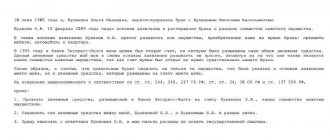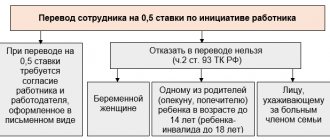It often happens that claims filed by citizens in court are rejected and not considered. Applying an application costs money, as does completing one, so it is important for people to know why an application may be rejected and how to avoid it. Often there is no time to redo the claim several times and you want it to be accepted immediately.
In this article we will tell you who makes the decision to accept a claim and what reasons there are for refusal to accept it, and we will also tell you what decisions the court can make other than refusal to consider.
Nuances of a negative decision in accepting a claim
The refusal to consider a claim can be accepted by the judicial body, which must subsequently make a ruling regarding it and then submit it for consideration. There are cases where the statement of claim is simply not returned or remains without a change at all, but does not disappear from the attention of the judicial authority. And there are situations where refusal to accept a claim means that the defense authorities will no longer accept it at all. The reasons are:
- Similar subject of claim.
- Similar requirements/conditions.
- Similar defendant.
It is worth noting that the presence of additional conditions here no longer has any significance. The grounds for a negative decision are completely different.
Reasons for a negative decision in accepting a claim
The judge makes a negative verdict in the following cases:
- The filed claim cannot be considered within the framework of civil proceedings. Such a document may be considered within the framework of administrative or criminal proceedings. As well as other judicial bodies.
- The claim stated contains demands and conditions that in no way apply to the applicant.
- The claim document was transferred by a person who has no relation to it. And also if the authorized person does not have a notarized power of attorney with him.
- A resolution has already been adopted regarding a similar conflict.
- If there is a decree to terminate civil proceedings due to the plaintiff’s refusal of the claim or settlement agreement.
- The arbitration body has already adopted a ruling on a similar case.
Expert opinion
Popov Dmitry Alekseevich
Practicing lawyer with 7 years of experience in banking law
It is worth noting that a claim cannot be refused if the applicant was unable to collect evidentiary facts. And also if he missed the stated submission deadlines. In addition, the defense authorities are prohibited from refusing to accept a petition if the demands in it are presented to an inappropriate defendant.
A petition may be returned but not refused for the following reasons:
- If the applicant did not try to resolve the conflict out of court.
- The application was submitted by a person who does not give an account of his actions.
- The petition was filed in the wrong court.
- The application is already being processed by this or an arbitration institution.
In the above cases, the claim may be returned or remain without progress.
Private complaint against a court ruling refusing to accept a statement of claim
To the St. Petersburg City Court from …………………………………………………………………………………..
PRIVATE COMPLAINT
for determination by ……….. district court of St. Petersburg dated ………..2018
I applied to the …….. district court of St. Petersburg with a statement of claim to establish the paternity of the deceased ………… against me. and recognition of ownership of the apartment belonging to him at the time of death by inheritance. In the basis of the claim, I stated that I am the son of the testator.
By the judge's decision……………. The district court of St. Petersburg ….. dated ……….2018 refused to accept my claim. I believe that this determination was made in violation of procedural law and deprives me of the right to go to court. The reasons for this are as follows.
As a basis for refusing to accept the statement of claim, citing Part 1 of Art. 134 of the Code of Civil Procedure of the Russian Federation and came to the conclusion that the application is not subject to consideration and resolution in civil proceedings, since the application is considered and resolved in a different court order.
Art. 3 of the Code of Civil Procedure of the Russian Federation provides that an interested person has the right, in the manner established by the legislation on civil proceedings, to apply to the court for the protection of violated or disputed rights, freedoms or legitimate interests.
I, believing that I am the son of a deceased testator, who recognized me as his son during his lifetime, filed a lawsuit to exercise my inheritance rights. My inheritance right can arise only if the fact is established that the testator was my father. The fact that the testator died entails the loss of his legal capacity, but I did not file a claim for recognition of any rights for the deceased, but applied for the protection of my rights, albeit supposed ones, and they arise only if the testator was by my father. Therefore, all the obvious conclusions of the court that my putative father’s legal capacity has ceased have no legal meaning when considering the issue of accepting the statement of claim.
If the statement of claim refers to the establishment of paternity, and not the fact of paternity of the testator in relation to me, then for this purpose there is a stage of preparing the case for trial, due to which, on the basis of Art. 149 of the Code of Civil Procedure of the Russian Federation specifies the claims.
I filed a claim for recognition of the existence of an inheritance legal relationship. Claims for recognition of rights are considered within the framework of civil proceedings.
If we turn to existing judicial practice, then such claims are considered by all courts. I will give examples.
Appeal ruling of the Nizhny Novgorod Regional Court dated November 1, 2016 in case No. 33-13203/2016: Requirement : To establish paternity , the fact of acceptance of inheritance, recognition of property rights . Circumstances: The plaintiff indicates that her father died, her parents lived together, ran a joint household, they had a daughter, that is, she, however, neither before her birth nor after the marriage between the plaintiff’s parents was concluded, however, during her lifetime her father ( the testator) recognized himself as the father of the plaintiff, was involved in her upbringing, supported her, and took care of her. Solution: Request satisfied.
Appeal ruling of the Moscow City Court dated March 18, 2015 in case No. 33-8514
Demand: To establish the fact of paternity, the right to inheritance, and restore the deadline for accepting an inheritance.
Circumstances: The plaintiff indicated that throughout his life the testator recognized himself as the father of her daughter, took care of her, and provided for her.
Decision: The requirement is satisfied, since taking into account the conclusions of the forensic medical examination, written evidence, and witness statements, sufficient evidence was presented to support the stated requirements, the reasons for missing the deadline are valid.
Appeal ruling of the Moscow Regional Court dated April 17, 2013 in case No. 33-8588/2013
The claim to establish the fact of paternity, to enter information about the father into the child’s birth record, to restore the period for acceptance of the inheritance, to recognize the certificate of inheritance as partially invalid was satisfied legally, since the court recognized the lack of proof of the fact of paternity at the time of the testator’s death as a valid reason for restoration of the deadline for accepting an inheritance.
Thus, similar claims, although rare, are nevertheless considered by courts of general jurisdiction. From the contents of the statement of claim it is clear that I did not ask for recognition of any rights of the deceased, but demanded that my right to inherited property be recognized, i.e. there is a usual dispute about the right between living persons, between me and the heir of my putative father.
Paragraph 6 of the Resolution of the Plenum of the Supreme Court of the Russian Federation dated May 29, 2012 N 9 “On judicial practice in inheritance cases” provides that the court refuses to accept a statement of claim brought against a deceased citizen, with reference to paragraph 1 of part 1 of Article 134 of the Code of Civil Procedure of the Russian Federation , since only a person with civil and civil procedural legal capacity can be held liable for violation of the rights and legitimate interests of a citizen.
In our case, the claim is brought against a person with legal capacity, and not against a deceased citizen. I believe that the court misunderstood this particular explanation, but it is not applicable to my dispute.
In connection with the above
ASK:
Cancel the ruling of the judge ………….. district court of St. Petersburg …….. dated ……….2018 on the refusal to accept the statement of claim and resolve the issue of its acceptance on the merits.
Application:
- A copy of the statement of claim and materials attached to the statement of claim.
____ ________ 2021 ______________
How should a refusal to accept a claim be formalized?
After receiving the petition, the judge is given five days to make a reasoned ruling. It must contain references to the facts that impede its acceptance into work.
When a refusal occurs, the judicial authority should not explain to the citizen what he needs to correct, where to turn, and how to resolve the issue of violated rights and interests.
In the final ruling, the judicial institution must indicate that such a statement of claim cannot be brought again to court.
It is worth noting that if the judge, when accepting the petition, does not immediately make a ruling on it, he is obliged to notify the applicant of the date and time of receipt of this document.
Expert opinion
Popov Dmitry Alekseevich
Practicing lawyer with 7 years of experience in banking law
The judicial authority does not have the right to first open civil proceedings and then refuse to accept the claim. In this situation, it is necessary to terminate the proceedings.
Registration procedure
The claim is considered by the official within 5 days, after which it is accepted for proceedings or a decision is made to refuse.
The determination shall indicate the reasons why the case cannot be initiated. The document does not provide recommendations on what actions the plaintiff should take to eliminate the violations. But it is stipulated that repeated appeal to the court on this issue is not allowed. The applicant is informed of the date and time of receipt of the determination. If he cannot be present in person, then the document is allowed to be picked up by an authorized person with a notarized power of attorney.
Once the case has been opened, a refusal to accept the claim cannot be issued. In such a situation, the proceedings are terminated.
Who has the authority to make the decision?
At the first stage, the statement of claim is transferred to the court office. It is subsequently sent to the judge. If he decides that the claim complies with the requirements of regulations, then he accepts it for consideration.
This right, as well as a possible refusal, is regulated by article number 133 of the Civil Procedure Code of the Russian Federation.
Based on this act, the judge makes a final decision on the application. He must make a determination within five days from the date of receipt of the petition.
Challenging a negative decision in accepting a claim
Before writing a complaint against the refusal to accept a claim, you must make sure that the ruling made is really illegal. To challenge such a decision, it is necessary to file a private complaint with the highest judicial body through the court that made the negative decision.
You can challenge the determination within fifteen days after the negative verdict is issued.
This is the only way to challenge the refusal. Therefore, either appeal it or file a new claim.
Grounds for refusal
The full list of reasons for a negative decision on a claim is indicated in article number 134 of the Civil Procedure Code of the Russian Federation. This list is complete, so other reasons for refusal will not be accepted. However, the list can be increased or decreased at the request of the judge. This was done in order to narrow the judicial review when opening proceedings in court.
According to article number 134 of the Civil Procedure Code of the Russian Federation, a judge may refuse to accept a claim in the following cases:
- If the petition has been transferred to the wrong court, or it is already being considered in a different court order.
- This statement was created to protect the rights and interests of those persons who do not have the legal right to do so.
- This complaint contains claims and issues that are in no way related to the applicant.
- On such a petition, a final decision has already been made, which has entered into legal force. Or the filing of such a claim has already been refused earlier.
We conclude that one way or another, the refusal is due to the fact that the applicant simply does not have the authority to submit such an application. However, it is worth noting that absolutely any citizen has the right to file a petition if there really are grounds for its acceptance.
The judge does not have the authority to refuse to consider a claim solely at his own request. These actions relate to violations of the Civil Procedure Code of the Russian Federation.
The judicial body cannot study and consider the same records again. This does not imply an appeal, but rather a re-admission.
If the parties to the conflict have an agreement on the basis of which disputes are resolved only in arbitration, then in this case any other judicial body should not accept such a statement of claim.
Refused to accept. What to do?
Refusal to accept a claim means that such a petition, the subject of the claim and the defendant are already involved in the proceedings, or a decision has already been made on it and has entered into force. This implies that no court will be able to accept it anymore. The court of general jurisdiction also applies here.
If a citizen has gone through all the stages of challenging, if there is no miscarriage of justice, then the applicant must abandon the idea of filing a claim in this form. But he can draw up a new petition, changing its content: the subject of the claim, the stated demands. Or you can try to solve the problem in another security agency.
If a person has been denied acceptance of a statement of claim, he may file a petition for a refund of the state fee.
Commentary on Article 134 of the Code of Civil Procedure of the Russian Federation
1. Clause 1 part 1 art. 134 of the Code of Civil Procedure of the Russian Federation names three independent grounds for refusing to accept a statement of claim. Firstly, if consideration of the application is not within the jurisdiction of courts of general jurisdiction. In the law, this basis for refusing to accept a statement of claim is formulated less successfully than in Art. 129 Code of Civil Procedure of the Russian Federation RSFSR 1964 What does it mean: “since the application is considered and resolved in a different court order”? Obviously, a different judicial procedure is criminal, administrative, and constitutional proceedings, but none of them is a claim. At the same time, civil proceedings in accordance with Part 2 of Art. 118 of the Constitution covers proceedings, including claims, in arbitration courts. However, there is no doubt that it is mandatory to refuse to accept a claim if its consideration and resolution are within the jurisdiction of the arbitration court. It should be noted that when filing an application in court that combines several related claims, some of which are within the jurisdiction of a court of general jurisdiction, others - of an arbitration court, all of them are subject to consideration and resolution in a court of general jurisdiction (see commentary to Art. 22).
The second of those mentioned in clause 1, part 1, art. 134 of the Code of Civil Procedure of the Russian Federation, the grounds for refusing to accept a statement of claim are not related to the plaintiff’s lack of right to go to court. It applies if a body of public law education, an organization or a citizen who is not entitled to such an appeal by federal law, contrary to Part 1 of Art. 46 Code of Civil Procedure. By analogy, the reason under consideration for refusing to accept a statement of claim applies if it is filed by a prosecutor who is not vested with the appropriate authority.
The last of those mentioned in clause 1, part 1, art. 134 of the Code of Civil Procedure of the Russian Federation has no relation to the claim proceedings. We are clearly talking about statements challenging normative and non-normative legal acts. Although, strictly speaking, it cannot be used when deciding the issue of accepting applications to challenge the above-mentioned legal acts, since from the content of Part 1 of Art. 251 and part 1 of Art. 254 of the Code of Civil Procedure of the Russian Federation it follows that for its positive decision it is enough that the applicant considers his rights and freedoms to be violated. It seems that the Supreme Court of the Russian Federation in Resolutions of the Plenum of November 29, 2007 No. 48 and No. 2 of February 10, 2009 went beyond the official interpretation of the norms of Chapter. 24 and 25 of the Code of Civil Procedure of the Russian Federation, explaining to the courts their obligation to refuse to accept an application on the basis of clause 1 of part 1 of Art. 134 of the Code of Civil Procedure of the Russian Federation, if the contested act obviously does not affect the rights and freedoms of the applicant. The correctness of the positions of the authors who deny the admissibility of refusing to accept an application on the grounds under consideration is confirmed in the acts of the Constitutional Court of the Russian Federation <1>. The Constitutional Court of the Russian Federation insists on the inadmissibility of a judge determining the presence or absence of the rights and obligations of the applicant and other persons when deciding whether to accept an application without holding a court hearing with the participation of interested parties. ——————————— <1> See: Definitions of the Constitutional Court of the Russian Federation dated July 8, 2004 N 238-O, dated October 20, 2005 N 513-O, dated January 24, 2006 N 3-O.
In accordance with clause 2, part 1, art. 134 of the Code of Civil Procedure of the Russian Federation, the basis for refusing to accept a statement of claim is the inadmissibility of accepting a statement of claim and initiating proceedings in a civil case in the presence of a court decision that has entered into legal force on a dispute between the same parties, on the same subject and on the same grounds, or a court ruling on termination proceedings in connection with the acceptance of the plaintiff’s refusal of an identical claim or the approval of a settlement agreement between the parties on an identical claim. It should be added to the above that the basis for refusing to accept a claim is the presence of a court ruling that has entered into legal force to terminate proceedings on an identical claim and on other grounds named in Art. 220 Code of Civil Procedure of the Russian Federation, in accordance with Art. 221 Code of Civil Procedure.
The basis for refusing to accept the statement of claim in accordance with clause 3, part 1, art. 134 of the Code of Civil Procedure of the Russian Federation is the presence of an arbitration court decision that has become mandatory for the parties, adopted on a dispute between the same parties, on the same subject and on the same grounds, except in cases where the court refused to issue a writ of execution for the forced execution of the arbitration court decision.
The refusal to accept the claim is associated with the establishment, along with the identity of the claims, of the following additional conditions established by Art. 42 Federal Law “On Arbitration Courts in the Russian Federation”:
a) the validity of the agreement concluded between the parties to transfer the case to arbitration;
b) compliance of the composition of the arbitration tribunal with the requirements of the law;
c) notification of the party against whom the decision was made by the arbitration court about the election (appointment) of arbitrators, the time and place of the arbitration court meeting;
d) jurisdiction of the dispute on which the decision was made to arbitration courts;
e) compliance of the arbitration court decision with the fundamental principles of Russian law.
It should be noted that the arbitration agreement may provide that the decision of the arbitration tribunal is final, i.e. is not subject to dispute. However, when issuing a writ of execution for the forced execution of an arbitration court decision, the same conditions are subject to verification as when challenging an arbitration court decision (compare Articles 421 and Article 426 of the Code of Civil Procedure of the Russian Federation). This explains the inclusion in the content of clause 3, part 1, art. 134 of the Code of Civil Procedure of the Russian Federation as a condition excluding refusal to accept an application, the presence of a refusal by the competent court to issue a writ of execution for the forced execution of an arbitration court decision.
2. Part 2 art. 134 of the Code of Civil Procedure of the Russian Federation obliges the court to issue a ruling to refuse to accept the statement of claim and either serve it on the applicant in person or send it by mail along with the statement of claim and the documents attached to it.
3. Part 3 art. 134 of the Code of Civil Procedure of the Russian Federation contains additional to the circumstances specified in clauses 1 - 3, part 1 of Art. 134 of the Code of Civil Procedure of the Russian Federation, grounds for refusal to accept a statement of claim - if there is a judge’s ruling to refuse to accept an identical claim.








